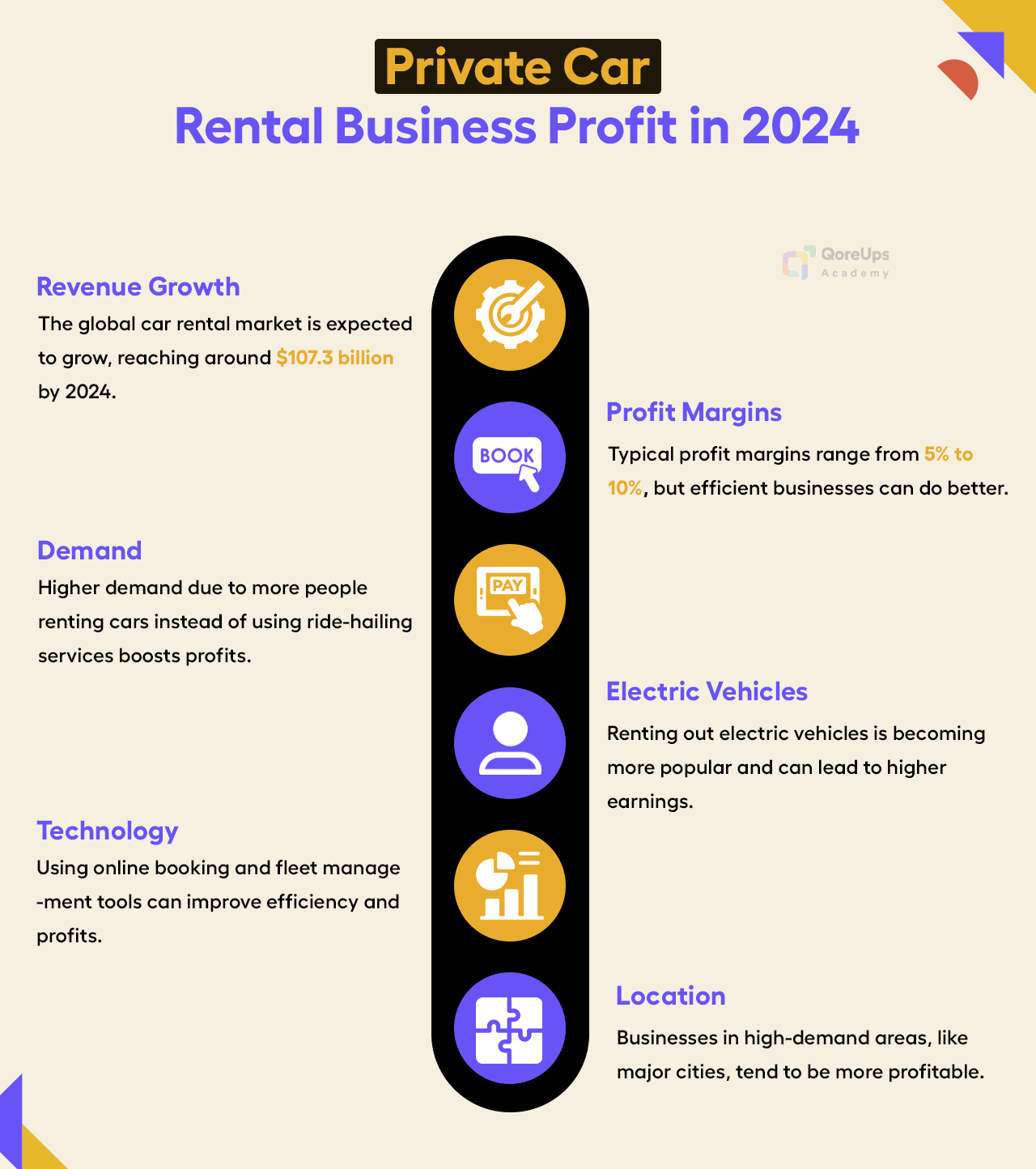Starting a private car rental business can be a lucrative venture, particularly given the growing demand for flexible transportation options and advancements in technology.
Despite the common perception to start a car rental business requires a significant investment, it is possible to launch a basic operation with a minimal budget.
This comprehensive guide will explore how to start a private car rental business under $50, including insights into the industry, market trends, profitability, and practical steps to get your business off the ground.
Understanding a Private Car Rental Business
A private car rental business involves offering vehicles for rent on a short-term basis.
Unlike traditional rental companies, which often have large fleets and extensive resources, private car rental businesses typically operate on a smaller scale.
This allows for a more personalized service and a focus on niche markets. Let’s look deeper at what running a private car rental business entails.
Car Rental Market Trends
Increased Demand for Flexibility
Modern consumers are increasingly seeking flexible rental options. This includes short-term rentals, subscription models, and one-way rentals.
The shift towards these flexible solutions is driven by changing travel habits and a desire for convenience.
Consumers today prefer more adaptable transportation solutions that fit their unique needs and schedules.
Growth in Electric and Hybrid Vehicles
As environmental awareness rises and fuel costs fluctuate, both consumers and rental companies are turning to greener options.
Electric and hybrid vehicles are becoming more popular within rental fleets. This trend reflects a broader shift towards sustainability and a reduction in the environmental impact of transportation.
Technology Integration
Technology is reshaping the car rental industry. Advanced technologies such as AI and machine learning are being used for dynamic pricing, while mobile apps offer seamless booking and management experiences.
Additionally, IoT (Internet of Things) technology is increasingly used for fleet tracking and maintenance, enhancing operational efficiency and customer satisfaction.
Expansion of Mobility-as-a-Service (MaaS)
The concept of Mobility-as-a-Service (MaaS) integrates car rentals into broader transportation solutions, including ride-sharing and public transit options.
MaaS platforms are providing comprehensive transportation solutions that encompass car rentals, offering users a more integrated and convenient travel experience.
Enhanced Customer Experience
Improving customer experience has become a major focus for car rental companies. This includes offering personalized services, streamlining booking processes, and providing exceptional customer support.
Investments in user-friendly interfaces and loyalty programs are common practices aimed at enhancing customer satisfaction and retention.
Sustainability Initiatives
The industry is increasingly focusing on sustainability.
Rental companies are adopting practices such as carbon offset programs, incorporating eco-friendly vehicles into their fleets, and reducing the environmental impact of their operations.
These initiatives align with the growing consumer demand for environmentally responsible services.
Dynamic Pricing Models
Dynamic pricing, which adjusts rental rates based on factors like demand, location, and time, is becoming more prevalent.
This model helps rental companies maximize revenue and better align supply with demand. Businesses can implement flexible pricing strategies that optimize profitability by leveraging data and technology.
Private Car Rental Business Profit in 2024
The profitability of a private car rental business in 2024 can vary widely depending on several factors, including location, fleet size, pricing strategies, and market demand.
Let’s see some general statistics and trends related to the industry:
Revenue Growth
- Global Car Rental Market: The global car rental market was valued at approximately $98.14 billion in 2023 and is projected to grow to around $107.3 billion by 2024, with a compound annual growth rate (CAGR) of 9.4% from 2023 to 2028.
- North America: In North America, where the U.S. dominates, the market is expected to see significant growth due to increased travel demand and the popularity of short-term rentals.
Profit Margins
- Average Profit Margins: Profit margins in the car rental industry typically range from 5% to 10%. However, businesses with efficient operations, a well-maintained fleet, and strong customer demand can achieve higher margins.
- Cost Factors: Key costs include vehicle acquisition, maintenance, insurance, and marketing. Efficient management of these costs is crucial for maintaining profitability.
Demand and Utilization Rates
- Increased Utilization: The trend towards car-sharing and the growing number of travelers opting for rentals instead of ride-hailing services are boosting the utilization rates of rental vehicles, contributing positively to profitability.
- Electric Vehicle Rentals: With the rise of electric vehicles (EVs), there’s an increasing demand for EV rentals, which can command higher rental prices and potentially higher profits.
Competitive Landscape
- Local vs. Global Players: Private or independent car rental businesses often compete with large, established companies like Enterprise, Hertz, and Avis. Niche markets, personalized services, and unique vehicle offerings can help private businesses differentiate themselves and maintain profitability.
Technology Integration
- Digital Platforms: Businesses that leverage technology, such as online booking platforms, mobile apps, and automated fleet management systems, are more likely to increase operational efficiency and profitability.
Regulatory Impact
- Taxation and Regulation: Changes in taxation, environmental regulations, and safety standards can impact costs and, consequently, profit margins. Staying compliant and optimizing operations accordingly is essential.
Key Markets
- Urban Areas: Urban centers, particularly in states like California, New York, and Florida, tend to be more profitable due to higher demand from tourists and business travelers.
- Seasonal Fluctuations: Demand for car rentals often peaks during holiday seasons and summer months, contributing to higher profits during these periods.
In summary, while the private car rental business in 2024 is positioned for growth, profitability will depend on effective cost management, strategic location, and the ability to adapt to market trends and technological advancements.

What Do I Need To Start A Private Car Rental Business?
Starting a private car rental business involves several key steps and requirements. Let’s breakdown of what do you need to start a private car rental business.
Business Plan For Your Private Car Rental Business
A comprehensive business plan is essential for outlining your goals, target audience, competitive analysis, and financial projections.
Research your market to understand demand and competition, and define your private car rental business model to ensure a clear path to profitability.
Use the car rental business model canvas to visualize your business plan.
Legal Requirements
Register your private car rental business and obtain the necessary licenses and permits. This may include a business license, rental car license, and insurance coverage.
Ensure compliance with local regulations and industry standards to operate legally and avoid potential legal issues.
Fleet Acquisition
Decide whether to purchase or lease vehicles for your rental fleet. Establish a maintenance routine to keep your vehicles in good condition.
Start with a small fleet to minimize initial costs and expand as your business grows.
Technology Setup
Implement car rental software or build a website to manage bookings and track your fleet.
Investing in technology can streamline operations, improve customer experiences, and enhance overall efficiency.
Build car rental software that meets your needs and integrates well with your business processes.
Marketing and Branding
Develop a strong brand identity and create an online presence for your private car rental business. Utilize social media platforms, local classifieds, and online directories to promote your services.
Effective marketing strategies will help attract customers and build your reputation in the market.
Operations and Staff
Hire staff if needed, set up your office, and establish clear policies for rental procedures.
Ensure that your operations run smoothly and provide excellent customer service. Well-defined processes and a professional team will contribute to your business’s success.
Financing
Secure funding to cover initial expenses and manage your finances effectively.
Explore options such as loans, investments, or personal savings to finance your business.
Proper financial management is crucial for maintaining liquidity and ensuring long-term success.

Start A Private Car Rental Business Under $50 | 5 Steps
Starting a private car rental business on a tight budget requires careful planning and resourcefulness.
Let’s a step-by-step guide to help you get started for under $50.
Research and Plan
Identify your target market by analyzing local demand for private car rental business. Look into competitors to understand their pricing, service offerings, and customer reviews.
Draft a simple business plan outlining your goals, target audience, pricing strategy, and operational procedures.
This plan will help you stay focused and organized as you start your business.
Cost: Free. Use free online resources to research your market and outline a basic business plan.
Register Your Private Car Rental Business
Choose a catchy, memorable name that reflects your brand. Check for name availability through your local business registry.
Depending on your location, you might need to register your private car rental business name with local or state authorities. This can usually be done online and is often affordable or even free.
Cost: $20-$30/year.
Create a Car Rental Software
Use a car rental software builder like QMarket. These platforms offer templates that are easy to customize, even without technical skills.
Include essential pages like Home, About, Services, Contact, and a Booking Form. Add high-quality images of your rental cars and clear descriptions of your services.
Cost: $49/month. Your car rental software should showcase your rental vehicles, allow customers to make bookings, and provide contact information. Utilize free marketing tools like social media and local listings to drive traffic to your site.
Get Insurance
Research insurance providers that offer coverage specifically for car rentals. Look for policies that include liability, collision, and comprehensive coverage.
Compare quotes from various insurers to find the most cost-effective option. Some insurance companies offer packages designed for small rental businesses, which could be cost-effective.
Cost: Variable depends on your location
Marketing and Outreach
Create profiles on major social media platforms (Facebook, Instagram, Twitter) and post regularly. Share updates, promotions, and customer testimonials to connect with and engage your audience.
List your rental service on free classifieds sites like Craigslist and Facebook Marketplace. Join local community groups and forums to spread the word about your business.
Encourage satisfied customers to refer friends and family. Offer referral discounts or incentives to build your customer base.
Cost: Free. Leverage free social media platforms and local classifieds to promote your service. Create engaging content and interact with potential customers to build awareness and attract bookings. Cost-effective marketing strategies can help you reach your target audience without a significant investment.
Overall Monthly Cost: $49 – $109
This budget covers essential startup expenses and ongoing costs for a basic private car rental business. You may need to adjust based on specific needs and local requirements.
By focusing on these budget-friendly steps, you can start your private car rental business with minimal upfront costs while laying a solid foundation for future growth.

Key Takeaways
Starting a private car rental business with a budget under $50 may seem challenging, but with strategic planning and resourcefulness, it’s entirely achievable.
The key lies in understanding the current market trends, leveraging technology, and managing costs efficiently.
- Start Small: Begin with a minimal fleet and scale up as your business grows.
- Follow Trends: Align your business with current market trends like flexible rentals and electric vehicles.
- Use Affordable Tools: Take advantage of free or low-cost resources for business setup and marketing.
- Manage Costs: Keep track of expenses related to vehicles, insurance, and marketing to stay profitable.
- Leverage Technology: Use budget-friendly software to streamline bookings and manage your fleet.
- Promote Wisely: Use free platforms like social media to build your brand and attract customers.
- Adapt and Grow: Continuously review your business and adjust based on market changes and customer feedback.
These steps will help you start and grow a private car rental business on a budget.
By focusing on essential elements such as a well-researched business plan, cost-effective registration, and affordable marketing strategies, you can lay a strong foundation for your business.
With careful planning and a strategic approach, you can build a thriving private car rental business that meets the needs of today’s consumers while staying within your budget.






